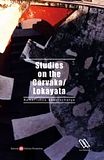Studies on the Carvaka/Lokayata
Bhattacharya, Ramkrishna:
Studies on the Cārvāka/Lokāyata / Ramkrishna Bhattacharya. - Firenze : Società Editrice Fiorentina, 2009. - 254 S.
ISBN 978-88-6032-113-8
EUR 28,00
DDC: 181.4
Beschreibung
Admittedly, there is paucity of material relating to the Cārvāka. Still, as in the case of the Presocratic philosophers of Greece, it is possible to reconstruct the basic tenets of this system on the basis of whatever little is found in the works of its opponents and the extracts quoted by them. Notwithstanding distortions, the Cārvāka/Lokāyata has emerged as the lone contender against the pro-Vedic Brahminical schools on the one hand, and the non-Vedic Buddhist and Jain schools on the other. Besides the orthodoxy prevailing around the Vedas, belief in after-life and after-world has been the bone of contention.
My endeavour has been to disprove certain notions about the Cārvāka/Lokāyata —two of which are generally admitted as being beyond doubt. They are as follows: (a) the Cārvāka-s did not approve of any other instrument of cognition except perception, and (b) they advocated unalloyed sensualism and hedonism. I have tried to show that both the charges are groundless calumnies. As to the first charge, there is enough evidence to show that the Cārvāka-s, in spite of their difference of opinion in other areas, did admit inference in so far as it was grounded on perception. As to the second charge, my contention is that no authentic Cārvāka aphorisms have been cited by the opponents of the Cārvāka to support their view, Moreover, the same charge was brought also against Epicurus, despite the fact that he disapproved of sensual gratification as the end of life. The common belief that all materialists are nothing but sensists is a misconception. [Aus dem Vorwort]
Inhalt
Preface. 9
Acknowledgements. 11
Abbreviations. 13
I. Origin of Materialism in India: Royal or Popular? 21
II. Jain Sources for the Study of Pre-Cārvāka Materialist Ideas in India. 33
III. Ajita Kesakambala: Nihilist or Materialist? 45
IV. Perception and Inference in the Cārvāka Philosophy. 55
V. Commentators of the Cārvākasūtra. 65
VI. Cārvāka Fragments: A New Collection. 69
VII. On the Authenticity of an Alleged Cārvāka Aphorism. 105
VIII. Paurandarasūtra Revisited. 109
IX. What Did the Cārvāka-s Mean by sukhaṃ jīvet? 123
X. Sāṃkhya, Yoga and Lokāyata in the Kauṭilīya Arthaśāstra: A Re-View. 131
XI. Yogācāra Against the Cārvāka: A Critical Survey of Tattvasaṅgraha, Chapter 22. 137
XII. Jayantabhaṭṭa’s Representation of the Cārvāka: A Critique. 147
XIII. What does Udayana mean by lokavyavahārasiddha iti cārvākāḥ? 159
XIV. Hemacandra on the Cārvāka: A Survey. 163
XV. Haribhadra’s Ṣaḍdarśanasamuccaya, Verses 81-84: A Study. 175
XVI. The Significance of Lokāyata in Pali. 187
XVII. On Lokāyata and Lokāyatana in Buddhist Sanskrit. 193
XVIII. Lokāyata and Lokāyatana in Sanskrit Dictionaries. 197
XIX. ṛṇaṃ kṛtvā ghṛtaṃ pibet: Who Said This?. 201
XX. jīvikā dhātṛnirmitā or jīviketi bṛhaspatiḥ?. 207
XXI. mṛtānāmapi jantūnām... 213
XXII. Cārvāka/Lokāyata Philosophy: Perso-Arabic Sources. 219
XXIII. What is meant by nāstika in the Nyāyasūtra Commentary? 227
Bibliography. 233
Autor
RAMKRISHNA BHATTACHARYA taught English at the University of Calcutta, Kolkata and is now Emeritus Fellow, University Grants Commission, India.
Quellen: Società Editrice Fiorentina; Libreria Universitaria.
Ähnlich
- Harimoto: God, Reason, and Yoga
- White: The Yoga Sutra of Patanjali
- Free Will, Agency, and Selfhood in Indian Philosophy
- Moksopaya ... Teil 4
- Der Weg zur Befreiung ... Buch 4
- Cross: Schopenhauer's Encounter with Indian Thought
- Todd: The Ethics of Śaṅkara and Śāntideva
- Periodization and Historiography of Indian Philosophy
- Rule-Extension Strategies in Ancient India
- Kumar: Classical Vaiśeṣika in Indian Philosophy

